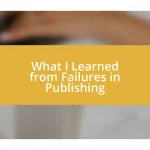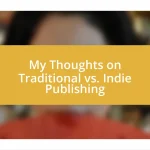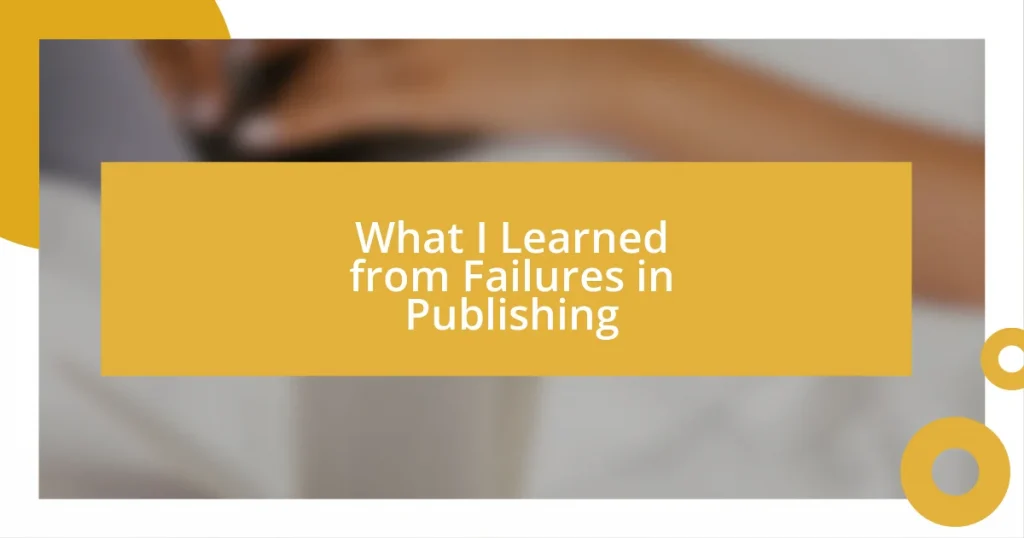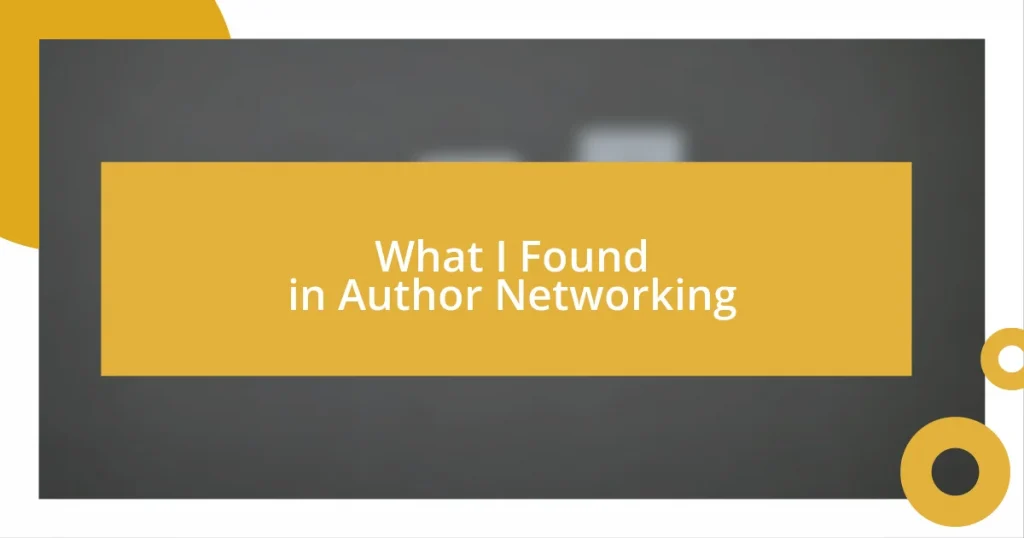Key takeaways:
- Rejections from literary agents are common and often reflect business decisions rather than the quality of one’s writing.
- Embracing feedback and using it as a learning tool can transform rejection into an opportunity for growth and improvement.
- Building resilience involves acknowledging disappointment, setting new goals, and finding support within the writing community to move forward after setbacks.
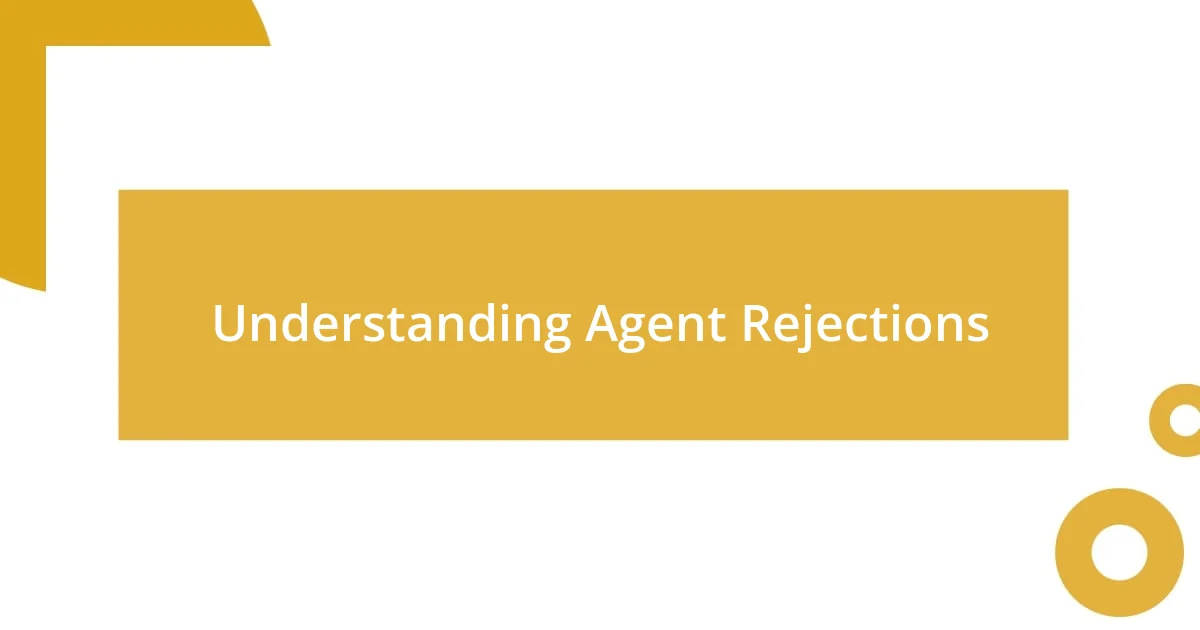
Understanding Agent Rejections
Rejections from literary agents can feel like a gut punch, can’t they? I remember receiving my first rejection email; it was a mix of disappointment and disbelief. It’s important to understand that agents are often inundated with submissions, and sometimes a project simply doesn’t align with their list or current interests.
I’ve learned that a rejection doesn’t necessarily reflect the quality of your work. When I faced a string of rejections with one of my manuscripts, I started to question my abilities. But looking back, I realize some of those agents were simply not the right fit for my style or genre. Isn’t it reassuring to remember that each rejection could be steering you closer to the right agent who truly appreciates your voice?
Ultimately, understanding the business side of things helps soften the blow. Agents are professionals making decisions based on market trends, not personal critiques. Embracing this perspective can transform rejection from a painful experience into a valuable lesson about refining one’s approach. What if I had taken those rejections too personally? I’d likely have given up instead of pushing forward to find my niche.
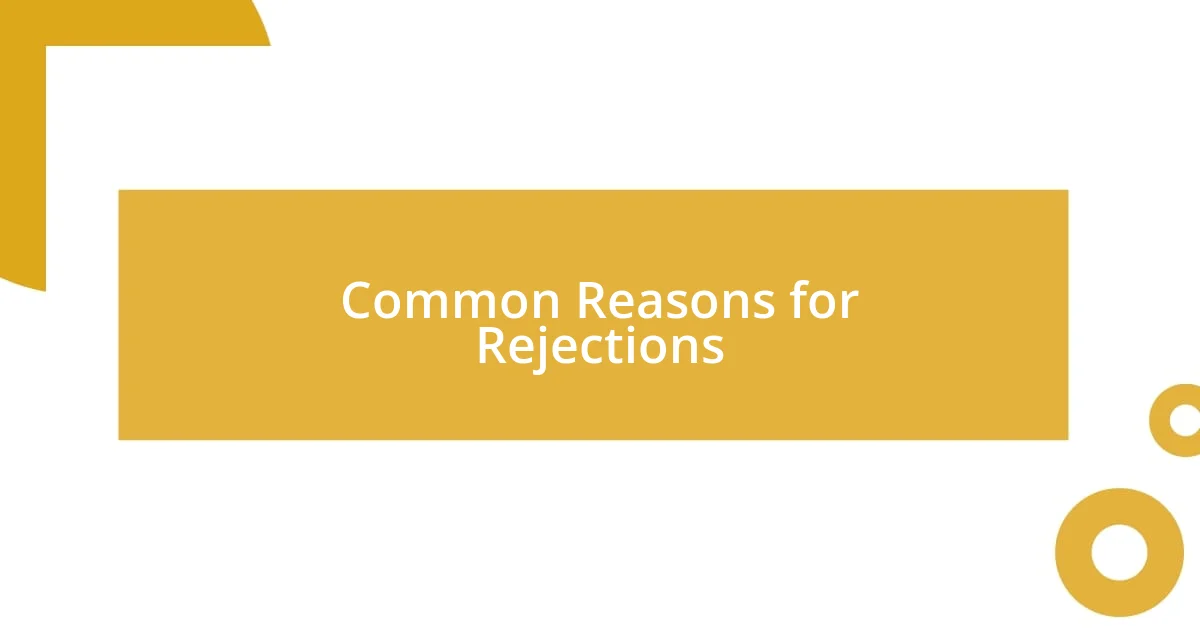
Common Reasons for Rejections
When I reflected on the reasons behind my own rejections, a few common themes emerged. One significant factor is the lack of a clear hook in the query or manuscript. I remember submitting a story that I loved deeply, but I neglected to succinctly convey its essence. An agent later told me that a compelling hook is essential to grab their attention in a crowded inbox.
Common reasons for rejections often include:
- Unclear Genre or Audience: If agents can’t pinpoint where your work fits in, it’s likely to be dismissed.
- Weak Opening: First impressions matter. If the beginning of your manuscript doesn’t captivate, many won’t read further.
- Overused Tropes: I learned that leaning too heavily on clichés can lead to swift rejections as agents seek fresh and original ideas.
- Poor Manuscript Presentation: Submitting a manuscript with formatting issues or grammatical errors can signal a lack of professionalism.
Through my journey, I’ve come to appreciate that sometimes the reasons for rejection aren’t about the story itself but rather the overall presentation and clarity. These insights have helped me refine my submissions, and I now approach each new project with a sharper focus on these details.
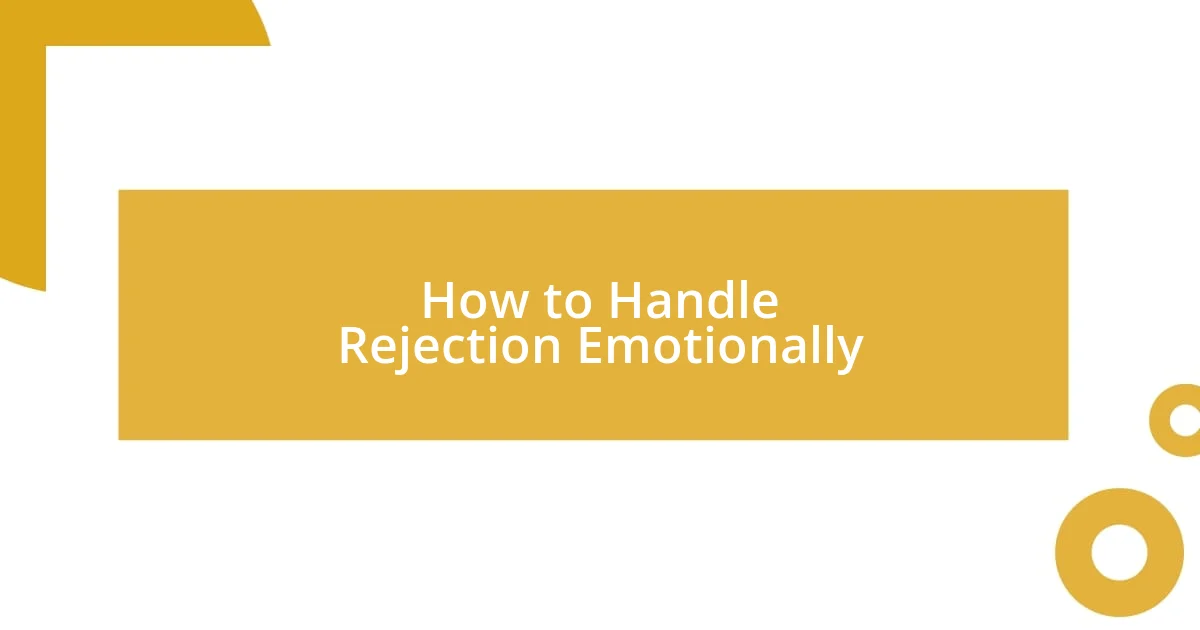
How to Handle Rejection Emotionally
I remember the first time I faced rejection from a literary agent. It felt like a dark cloud hovered over me for days. I was gripped by self-doubt, thinking maybe my writing wasn’t good enough. But through this emotional turmoil, I learned that allowing myself to feel those initial pangs of disappointment was crucial. It was also important to find healthy outlets. For me, writing in my journal became a therapeutic way to process my feelings, transforming raw emotions into creativity rather than paralysis.
As time went on, I realized I needed to shift my perspective. I started actively seeking support from fellow writers who understood this rollercoaster journey. Sharing my experiences with friends not only provided comfort but also reminded me that I wasn’t alone in facing rejection. I discovered the importance of viewing rejection as a stepping stone rather than a dead-end. By judging my writing against past experiences, I learned to see each rejection as feedback, an opportunity to sharpen my skills and refine my craft.
When I reflect on how I’ve grown emotionally through rejections, the comparison table below illustrates some strategies I’ve adopted versus common reactions. It’s fascinating how a slight shift in mindset can transform the whole experience.
| Common Reactions | Healthier Strategies |
|---|---|
| Doubt and insecurity | Journaling to explore feelings |
| Isolation from communities | Joining writing groups for support |
| Taking rejections personally | Viewing rejections as learning opportunities |
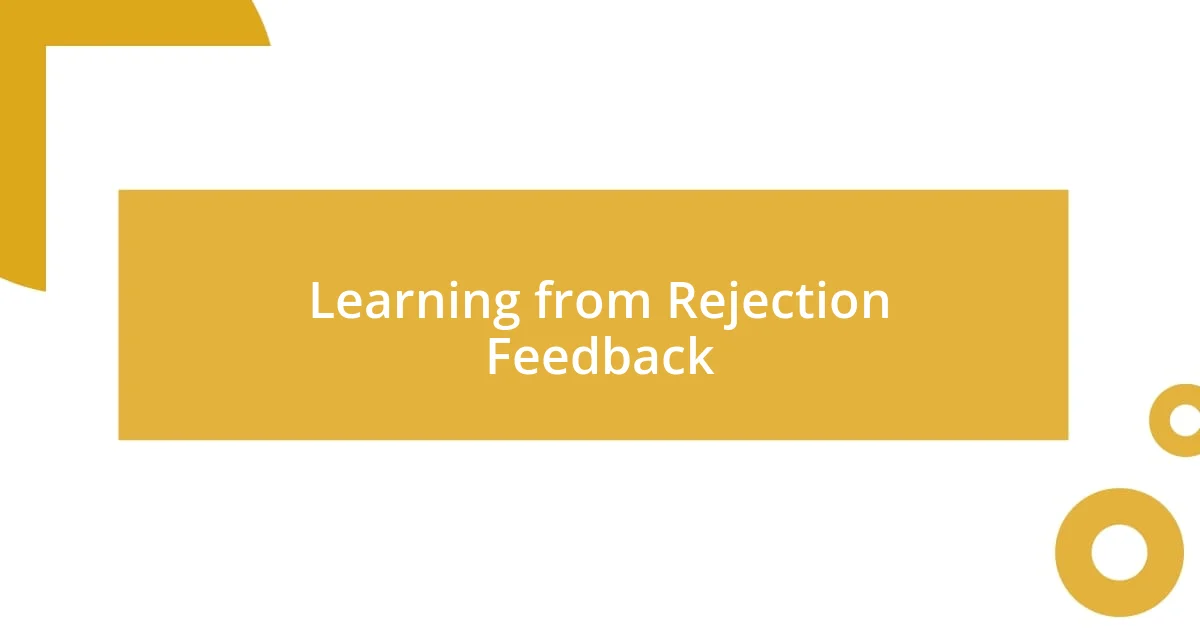
Learning from Rejection Feedback
When I first started receiving feedback on my rejections, I often felt frustrated and disheartened. I remember one agent’s note that mentioned my character development fell flat. Initially, I thought, “Do they even understand my vision?” But then I realized that constructive criticism could guide me towards creating deeper, more relatable characters. This shift in mindset transformed the feedback from a source of pain to a tool for growth.
I once received a rejection that praised my writing style but pointed out an unoriginal plot. At first, it stung. However, reflecting on the agent’s words made me consider how I could push beyond familiar formulas. Have you ever felt stuck in a narrative rut? I’ve found that digging into my own experiences and interests often uncovers unique angles that can add richness to my storytelling.
Learning to embrace rejection feedback has become integral to my writing journey. Every note, whether it’s encouraging or critical, serves as a compass directing me toward improvement. I now devour every piece of feedback, treating it like a treasure map that leads to better manuscripts. How can we grow without taking those bold steps forward? Embracing this learning process has helped me become a more resilient and thoughtful writer.

Improving Your Query Letter
When crafting a query letter, I’ve learned that clarity is paramount. I used to overload my letters with flowery language, trying to impress agents. Instead, I now focus on presenting my story succinctly, making sure every word serves a purpose. Have you ever read something and thought, “What am I even trying to say?” That’s how I felt before streamlining my approach.
Another lesson I took to heart was the importance of personalization. In one of my earlier attempts, I sent out a generic letter that felt flat and devoid of connection. But when I started researching agents, tailoring my queries to their preferences, I noticed a marked improvement in my responses. It’s like dating—doesn’t it feel more special when someone shows genuine interest? When I mention an agent’s recent work in my letter, it establishes rapport and demonstrates my commitment to finding the right fit.
Finally, I recommend paying attention to formatting and professionalism. I once received a polite rejection that included a note about a typo in my letter. That moment stung because I realized I had undermined my own credibility. Since then, I triple-check my queries for errors and ensure they follow industry standards. Have you ever felt embarrassed about a small mistake that changed someone’s perception? I know I have. A polished letter not only reflects my dedication but also sets the tone for how seriously my work will be taken.
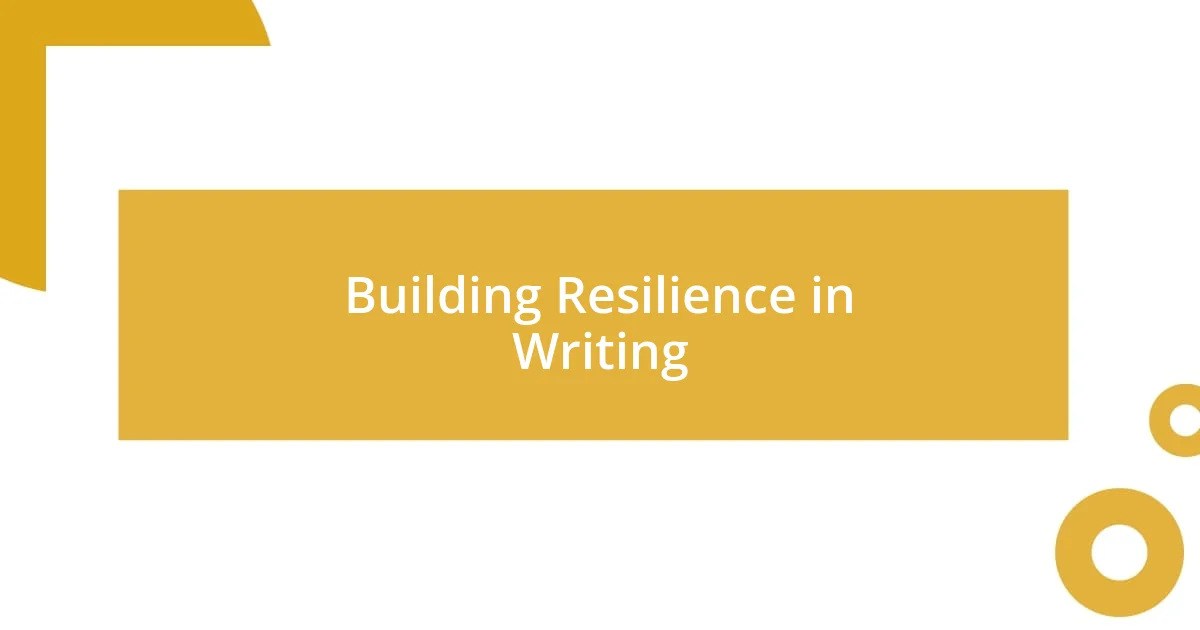
Building Resilience in Writing
Building resilience in writing isn’t just about toughening up; it’s about embracing the journey. I recall a time when I submitted a piece I believed was my best work, only to receive a rejection that left me feeling exposed and vulnerable. In the aftermath, I found solace in connecting with fellow writers who shared their own stories of rejection. It reminded me that we’re all navigating similar struggles, and those shared experiences became a source of strength.
As I continued to face setbacks, I learned to celebrate small victories, even when they felt overshadowed by disappointments. For instance, after a particularly discouraging round of submissions, I decided to set aside my manuscript for a week. During that time, I experimented with different genres and styles, surprising myself with the creative spark that ignited. Have you ever explored writing outside your comfort zone? This not only reenergized my passion but also built resilience, teaching me that every rejection could lead to a new path.
Ultimately, resilience in writing is about acceptance and adaptation. I used to believe that my worth as a writer was tied to acceptance letters, but now I recognize that growth stems from resilience. Each rejection has taught me lessons that refine my craft. Isn’t it fascinating how setbacks can become stepping stones? As I embrace this learning curve, I’m continually reminded that every experience, no matter how painful, contributes to my development as a writer.
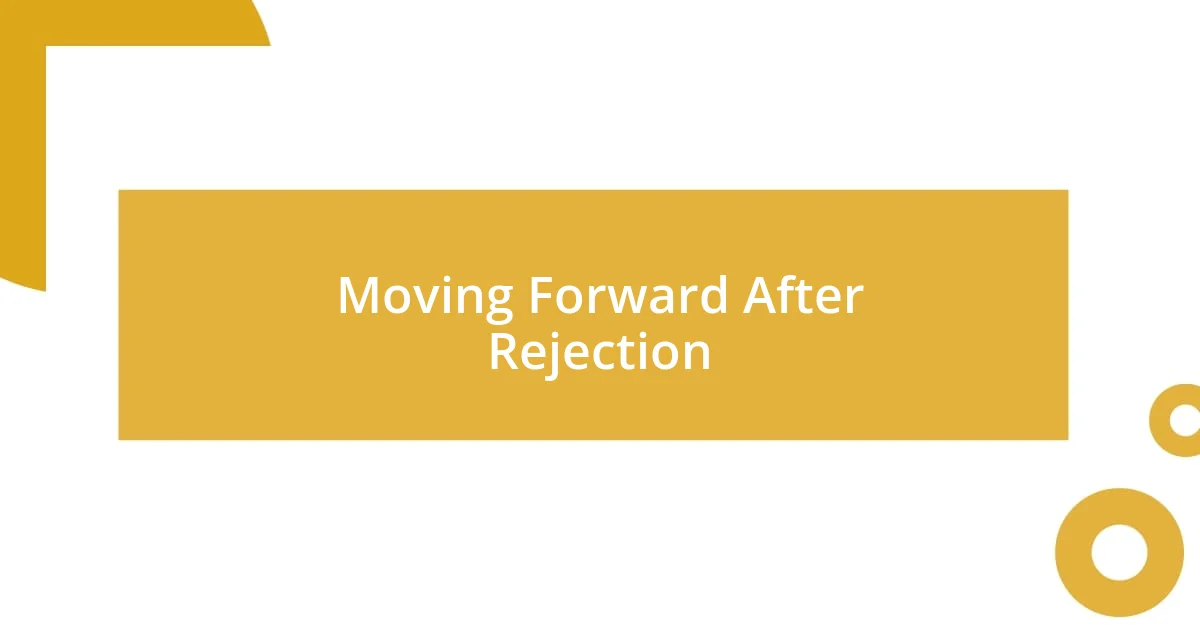
Moving Forward After Rejection
Sometimes, after a rejection, the initial sting can feel overwhelming. I remember staring at my emails, each dismissal feeling like a personal attack. But rather than wallowing in that moment, I chose to reflect on what I could learn. Have you ever taken a step back and asked yourself what each rejection teaches you? For me, it became a chance to reassess my work and identify areas I could improve.
I’ve also discovered the importance of setting new goals after a rejection. Instead of getting stuck in a cycle of self-doubt, I create tangible next steps. One time, after a series of rejections, I signed up for a writing workshop. The experience not only reignited my passion, but it also introduced me to a community that understood my struggles. Isn’t it amazing how surrounding yourself with supportive people can lift you up?
Moving forward doesn’t mean ignoring the pain; it means acknowledging it. I’ve come to appreciate the healing power of writing in my journal. Pouring out my thoughts helps me process emotions and refocus on my goals. Have you ever tried journaling after a setback? For me, it feels like a safe space where I can both grieve my disappointments and strategize my next moves, ultimately paving the way for growth.
